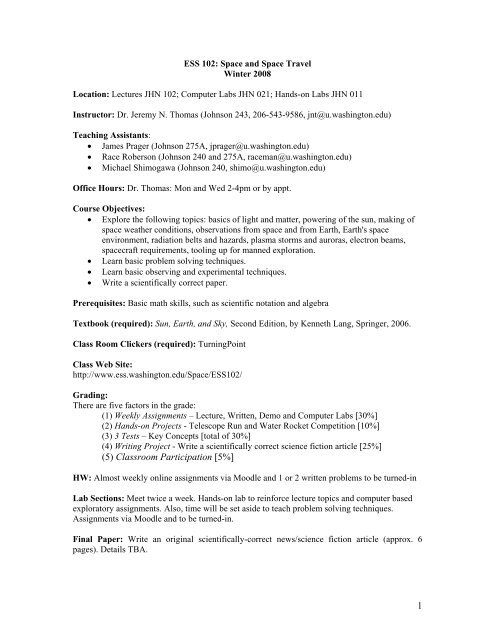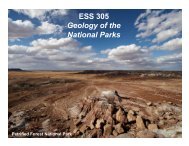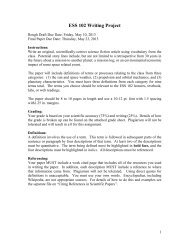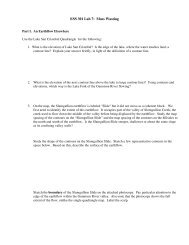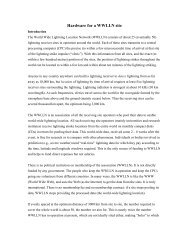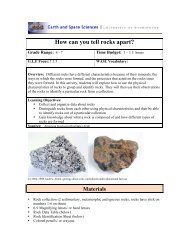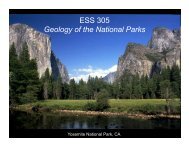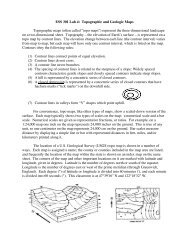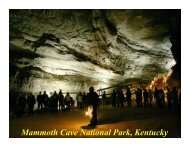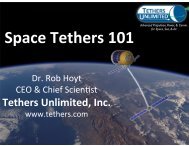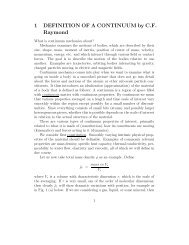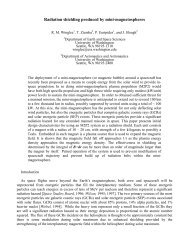ESS 102: Space and Space Travel - Earth and Space Sciences
ESS 102: Space and Space Travel - Earth and Space Sciences
ESS 102: Space and Space Travel - Earth and Space Sciences
- No tags were found...
Create successful ePaper yourself
Turn your PDF publications into a flip-book with our unique Google optimized e-Paper software.
<strong>ESS</strong> <strong>102</strong>: <strong>Space</strong> <strong>and</strong> <strong>Space</strong> <strong>Travel</strong>Winter 2008Location: Lectures JHN <strong>102</strong>; Computer Labs JHN 021; H<strong>and</strong>s-on Labs JHN 011Instructor: Dr. Jeremy N. Thomas (Johnson 243, 206-543-9586, jnt@u.washington.edu)Teaching Assistants:• James Prager (Johnson 275A, jprager@u.washington.edu)• Race Roberson (Johnson 240 <strong>and</strong> 275A, raceman@u.washington.edu)• Michael Shimogawa (Johnson 240, shimo@u.washington.edu)Office Hours: Dr. Thomas: Mon <strong>and</strong> Wed 2-4pm or by appt.Course Objectives:• Explore the following topics: basics of light <strong>and</strong> matter, powering of the sun, making ofspace weather conditions, observations from space <strong>and</strong> from <strong>Earth</strong>, <strong>Earth</strong>'s spaceenvironment, radiation belts <strong>and</strong> hazards, plasma storms <strong>and</strong> auroras, electron beams,spacecraft requirements, tooling up for manned exploration.• Learn basic problem solving techniques.• Learn basic observing <strong>and</strong> experimental techniques.• Write a scientifically correct paper.Prerequisites: Basic math skills, such as scientific notation <strong>and</strong> algebraTextbook (required): Sun, <strong>Earth</strong>, <strong>and</strong> Sky, Second Edition, by Kenneth Lang, Springer, 2006.Class Room Clickers (required): TurningPointClass Web Site:http://www.ess.washington.edu/<strong>Space</strong>/<strong>ESS</strong><strong>102</strong>/Grading:There are five factors in the grade:(1) Weekly Assignments – Lecture, Written, Demo <strong>and</strong> Computer Labs [30%](2) H<strong>and</strong>s-on Projects - Telescope Run <strong>and</strong> Water Rocket Competition [10%](3) 3 Tests – Key Concepts [total of 30%](4) Writing Project - Write a scientifically correct science fiction article [25%](5) Classroom Participation [5%]HW: Almost weekly online assignments via Moodle <strong>and</strong> 1 or 2 written problems to be turned-inLab Sections: Meet twice a week. H<strong>and</strong>s-on lab to reinforce lecture topics <strong>and</strong> computer basedexploratory assignments. Also, time will be set aside to teach problem solving techniques.Assignments via Moodle <strong>and</strong> to be turned-in.Final Paper: Write an original scientifically-correct news/science fiction article (approx. 6pages). Details TBA.1
Tests:• 3 Tests (50 minutes each) with multiple choice, short answer <strong>and</strong> 1 or 2 problems towork-out.• Tests 1 <strong>and</strong> 2 will be held during computer lab on approx. Jan. 29/31 <strong>and</strong> Feb 19/21.• Test 3 on March 14 during final lecture period (NO FINAL DURING EXAM WEEK)Grading PoliciesWritten Assignment Due Dates:All weekly homework that needs to turned into the TAs will be due in the following computer labsection on either Monday or Tuesday. No assignments will be accepted electronically (by email).You must physically h<strong>and</strong> them in, except for the on-line components which will also has a oneweekduration.Late Policy:Without PRIOR approval of your TA, no assignments of any kind will be accepted after the duedate.Missed-lab Policy:There will be NO make-up labs. If you need to miss your lab section, plan to attend anothersection instead. Attendance will be taken in each section <strong>and</strong> will affect your participation grade.TAs will drop the lowest demonstration lab <strong>and</strong> the lowest computer lab scores at the end of theterm.Missed-test Policy:The three tests will be in either computer lab or lecture. Make up tests are only available to thosewho are travel on exam day <strong>and</strong> who MAKE PRIOR arrangements with their TAs or documentedextenuating circumstances.Tentative Weekly Schedule:Week Topics1 The big picture: Overview <strong>and</strong> introduction to space.2 Matter <strong>and</strong> light: Atoms, spectra, solar power3 Layers of the Sun: The core, radiative, <strong>and</strong> convective zones4 The magnetic Sun <strong>and</strong> the solar atmosphere (Test 1 on about Jan 29/31)5 Planetary magnetic fields <strong>and</strong> the solar wind6 <strong>Space</strong> Weather: Aurora, radiation belts, <strong>and</strong> space hazards (1 st draft of paper due, TBA)7 Planetary motion <strong>and</strong> orbital mechanics (Test 2 on about Feb 19/21)8 Rockets <strong>and</strong> propulsion9 Solar system formation (Paper due, TBA)10 Exploring the solar system (Test 3 on March 14)TBA: A few guest lecturers who are experts in particular field of space science.2


